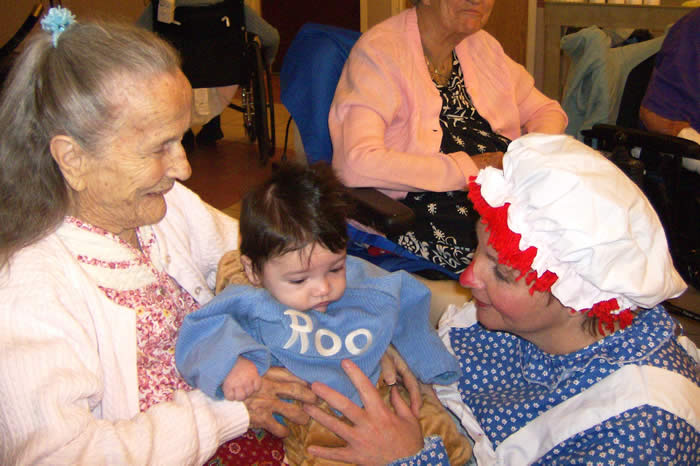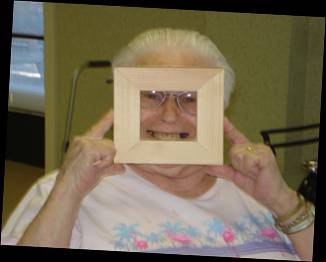 National Activity Professionals' Week is celebrated the last week of January. It is designed to honor activity professionals and the significant role they play in enriching the lives of the elderly and those they serve. National Activity Professionals' Week is celebrated the last week of January. It is designed to honor activity professionals and the significant role they play in enriching the lives of the elderly and those they serve.
The activity profession has evolved dramatically over the years. State and federal regulations have placed heightened value on quality of life activities, but the true sense of importance became apparent in June, 2006, with implementation of F Tag 248, revised Activities Guidance to Surveyors. This guidance clearly states that meaningful activities and quality of life are equally important as quality of care.
Today’s activity professionals, many of whom are nationally certified by the National Certification Council of Activity Professionals, plan, implement and evaluate person-centered, meaningful activities, specifically adapted to meet the needs and interests of each resident. Their particular training prepares them to work with diverse populations in a variety of settings and includes thorough assessment, care planning, and evaluation for each resident. Therapeutic activity services may include pet therapy, music, exercise, intergenerational programs, community outings, creative-expressive programs, cognitively challenging games, cultural programs, educational opportunities, spirituality, clubs and special events, programs for the cognitively impaired, domestic activities, and so much more.
 Even with more stringent qualifications, expectations and regulations, many activity professionals feel that they lack professional respect and appreciation. In fact, this was the number one concern that activity professionals across the country expressed in a recent questionnaire hosted by Re-Creative Resources Inc., called “Activity Professionals Speak-Out”. As the administrator of your health care facility, National Activity Professionals' Week is a perfect time to express appreciation on behalf of the residents, family and staff. Even with more stringent qualifications, expectations and regulations, many activity professionals feel that they lack professional respect and appreciation. In fact, this was the number one concern that activity professionals across the country expressed in a recent questionnaire hosted by Re-Creative Resources Inc., called “Activity Professionals Speak-Out”. As the administrator of your health care facility, National Activity Professionals' Week is a perfect time to express appreciation on behalf of the residents, family and staff.
Quite often the activity professional initiates and implements their own recognition events during their special week as a means of promoting the value of therapeutic activities. Most activity professionals would truly appreciate recognition and appreciation from the administrator and management team. The celebration and appreciation doesn’t have to be costly or time consuming but just a simple gesture to honor those individuals who do much more than provide activities. Here are just some other ways in which Administration, Department Heads, and facility staff can honor activity professionals this week and throughout the year.
- Write an article for the facility newsletter thanking Activity Professionals.
- Send each Activity Professional a letter of appreciation.
- Announce Activity Professionals Week over the public address system.
- Create and display flyers, posters, banners, etc.
- Organize and participate in other events scheduled during the week, i.e. Talent Show, themed-events, Fashion Show, etc.
- Have the department heads co-facilitate group activities throughout the week.
- Purchase t-shirts, mugs, pens etc. for the Activity Department with themes such as: Activities: More Than Just Bingo, or utilize the theme created by the National Activity Professionals Association.
- Give small gifts such as flowers, candy, gift certificates, gift baskets, etc.
- Send out a press release that promotes the benefits of activities at the facility.
- Host a ceremony, inviting residents, staff and family members. Give out awards, certificates, etc.
- Contact your state officials and ask that a proclamation be issued declaring that January National Activity Professionals Week in your city and state.
- Incorporate mandatory annual activity in-services at your facility.
- Support further education and continuing education. Activity professionals often encounter difficulty in finding the time or money to attend educational sessions.
- Support and encourage national certification. The National Certification Council for Activity Professionals is a Certifying Body recognized by Federal law, and incorporated in many state regulations. It is the only national organization that exclusively certifies activity professionals who work with the elderly.
- Purchase membership to state or National Activity Professionals Association. The NJ Activity Professionals Association offers affordable, educational workshops and conferences. Membership leads to education which leads to higher quality programming and better surveys.
- Assist the Activity staff in creating storyboards to put on display in the lobby. Other departments can help by participating in raffles, providing refreshments, transport residents to the display area, etc.
- Assure that the Activity Department is staffed appropriately and that the activity professionals are being paid accordingly. These were also major concerns for those who participated in the “Activity Professionals Speak-Out.”Unfortunately, not all states have mandatory staff to resident ratios for resident activities, and even those that do, may be considered bare minimum. NJ is one of the states that does have mandatory and advisory regulations however, the needs of each facility varies tremendously. In addition, many activities can be led by volunteers and facility staff, but activity professionals are specially trained to assess, plan, facilitate, and evaluate activities and this exclusive training should be taken into consideration when determining salaries.
Michael Hotz, LNHA, FACHCA, Administrator at the Health Center at Bloomingdale in Bloomingdale NJ, states, “Recreation is the sizzle on the steak of life in a Nursing Home.” As the administrator of your health care facility, I’m sure you understand and appreciate the person-centered quality of life services provided by the activity professionals. So, mark your calendars for this is the ideal time to honor the dedicated activity professionals in your facility.
This article was originally published in the American College of Health Care Administrators NJ Chapter News, December, 2008 (Volume 1, Issue 2).
*Click here to read Gaining Professional Respect
|
It’s so important to let everyone know about your programs all year round.
 We are always striving to develop creative techniques and implementing innovative ideas to improve resident care. The Therapeutic Recreation Department staff developed a program to give residents more say in planned activities which has resulted in greater resident participation and stronger relationships. We are always striving to develop creative techniques and implementing innovative ideas to improve resident care. The Therapeutic Recreation Department staff developed a program to give residents more say in planned activities which has resulted in greater resident participation and stronger relationships.
These are programs are planned and carried out by CBH staff, family, residents, and volunteers working together. The programs meet the needs of the residents as the resident defines them. In other words, the programs are done with the residents, not for them. Jody Roberts, Jenny Degray and Madeline Lopez, CBH office staff kicked off these programs by conducting a “Sweatin ‘to the Oldies” exercise activity.
The Dietary Department worked side by side with the Therapeutic Recreation staff to provide an afternoon of Malt Shop Memories. Residents discusses bobby socks, school sweaters, had chocolate malt shakes made in a large industrial blender right in front of them! Malts were served with a straw, whipped cream and a cherry on top! The Community Room was decorated with a constructed 57' Chevy, A pretend large jukebox while jukebox classics from the 1950s were played on a boom box located in the 57’ Chevy. This was a good focal point along with the giant “Rock and Roll” record and eighteen 33” records displayed all over the room with favorite artist from the fifties!
Donnie Morro, maintenance supervisor conducted a high school Wood Shop in the community room. Residents sanded, painted and decorated wooden picture frames to display in their rooms. Sheila Banas, DNS and “Heckling” Helen Cortes, Admissions coordinator provided an entertaining Cooking class On September 22nd. Residents and staff baked fresh homemade apple pies, while Helen heckled! Residents were greeted with the scent of fresh baked apple pies as they entered into the Community Room. Aroma's of cinnamon and spices brought back memories immediately to our Residents.
Some Residents remembered their mother baking a delicious hot apple pie as a Christmas tradition, or homemade apple cider that became a family favorite on those cold stormy winter nights. When it comes to our memories, it is a scent that reminds you of things more so than taste or touch, a relaxing occasion, that can assist Residents in recalling and reminiscing special times in their life. Residents had a chance to get to know the staff of CBH on a more personal level by finding new and satisfying social relationships and interacting in their environment. New and innovative ideas improve the lives of residents, and that is our ultimate goal.
|







